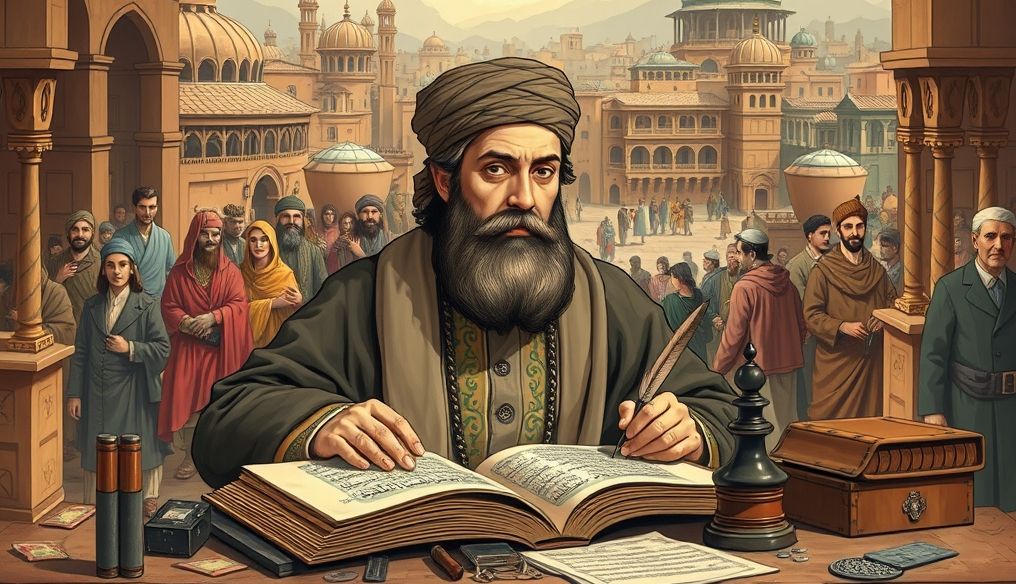Introduction: A Pioneer of Sociology
Abd al-Rahman ibn Muhammad ibn Khaldun al-Hadrami al-Ishbili, known as Ibn Khaldun, was an Arab Muslim historian and philosopher who lived in the 14th century AD. He is considered by many to be the founder of modern sociology, thanks to his insightful vision and deep analyses of human societies and their development.
The Emergence of Sociology in Ibn Khaldun's Thought
Sociology did not exist as a term or academic discipline in Ibn Khaldun's time. However, he developed a set of concepts and theories that form the core of this science. In his book "The Muqaddimah" (The Introduction), Ibn Khaldun laid the foundations for understanding social dynamics, the factors that affect the rise and fall of states, and the role of economic and cultural factors in shaping societies.
Basic Concepts in Ibn Khaldun's Social Thought
The Concept of Human Civilization ('Umran)
The concept of "human civilization" ('Umran) is one of the most important concepts introduced by Ibn Khaldun. This concept refers to organized human gatherings, whether nomadic or urban, and to the social, economic, and political relationships that bind their members.
Nomadic Civilization: Represents the simple life based on grazing and agriculture, characterized by strong social solidarity (Asabiyyah).
Urban Civilization: Represents the more complex life based on trade and industry, characterized by luxury and prosperity, but it may lead to weakening social solidarity.
Asabiyyah: The Basis of Social Solidarity
Asabiyyah is the bond of kinship or loyalty that brings together members of a tribe or group, and drives them to solidarity and cooperation. Ibn Khaldun believes that Asabiyyah is the driving force behind the establishment and growth of states, as it helps to unite efforts and achieve common goals.
However, Ibn Khaldun also believes that Asabiyyah may be a cause of the collapse of states, when it turns into a struggle for power and personal interests.
The Theory of Civilizational Cycles
Ibn Khaldun developed a detailed theory about civilizational cycles, where he sees that states go through successive stages of growth, prosperity, and decay. The state usually begins with strong Asabiyyah, then achieves success and prosperity, which leads to luxury and prosperity, and thus to weakening Asabiyyah and decay.
The civilizational cycle, according to Ibn Khaldun, consists of the following stages:
- The Stage of Emergence and Establishment: Characterized by strong Asabiyyah and wise leadership.
- The Stage of Stability and Prosperity: Characterized by economic prosperity and political stability.
- The Stage of Luxury and Decay: Characterized by luxury, corruption, and weakening Asabiyyah.
- The Stage of Collapse and Fall: Characterized by internal conflicts and external invasion.
The Impact of the Environment on Societies
Ibn Khaldun recognized the importance of the environment in shaping societies and determining their characteristics. He noted that societies living in harsh environments tend to be stronger and more resilient, while societies living in luxurious environments tend to be weaker and more extravagant.
He also pointed out that the environment affects the lifestyle, economy, and culture of different societies.
The Impact of Ibn Khaldun on Modern Sociology
Many modern sociologists have been influenced by Ibn Khaldun's ideas and considered him a pioneer in this field. Among these scholars:
- Auguste Comte: The founder of modern sociology, was influenced by Ibn Khaldun's concept of human civilization ('Umran).
- Émile Durkheim: Was influenced by Ibn Khaldun's concept of social solidarity.
- Max Weber: Was influenced by Ibn Khaldun's theory of civilizational cycles.
In addition, Ibn Khaldun's ideas have inspired many researchers in other fields, such as history, economics, and politics.
Criticism of Ibn Khaldun's Views
Despite the importance of Ibn Khaldun's ideas, they were not without criticism. Among the criticisms directed at him:
- Excessive Focus on Asabiyyah: Some critics believe that Ibn Khaldun exaggerated the importance of Asabiyyah and ignored other factors that affect the development of societies.
- Bias towards Arab Islamic Culture: Some critics believe that Ibn Khaldun was biased towards Arab Islamic culture and did not give other cultures their due in study and analysis.
- Historical Determinism: Some critics believe that Ibn Khaldun's theory of civilizational cycles is characterized by historical determinism, as it assumes that states are destined to go through specific stages of growth and decay.
The Importance of Studying Ibn Khaldun's Thought in the Modern Era
Despite the passage of centuries since his death, Ibn Khaldun's ideas are still relevant to the contemporary reality. Our understanding of social dynamics, the factors that affect the rise and fall of states, and the role of economic and cultural factors in shaping societies can help us face the challenges facing our world today.
In addition, studying Ibn Khaldun's thought can help us understand the Arab Islamic heritage and rediscover its contributions to human civilization.
Conclusion
Ibn Khaldun left a rich intellectual legacy in sociology. His insightful vision and deep analyses of human societies, and his theories about human civilization ('Umran), Asabiyyah, and civilizational cycles, are still relevant to modern social studies. Studying Ibn Khaldun's thought can help us understand our contemporary world and face the challenges that confront us.
References:
- Ibn Khaldun, Abd al-Rahman. The Muqaddimah.
- Laroui, Abdallah. The Concept of History.
- Al-Jabri, Mohammed Abed. We and the Heritage.




